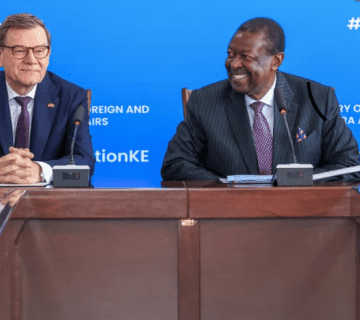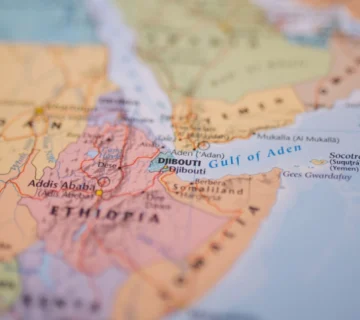The recent spate of diplomatic rows between Kenya and Tanzania over Coronavirus protocols is the latest development in what can be described as an increasingly deficient practice of Kenya’s foreign policy within the larger Horn of Africa region. Arguably, Kenya has a tepid diplomatic relationship with nearly all its neighboring countries; a diplomatic flare-up with Tanzania, Somalia, and Djibouti, and a lukewarm relationship with Uganda and Ethiopia. While Kenya’s foreign policy document adopted in 2014 pegs its success on strong bilateral relations and regional integration, its effect on forging good relations with neighboring countries has been underwhelming, resulting in diplomatic friction and bad relations. In a region that is increasingly becoming antagonistic and diplomatic relations growing more volatile, Kenya’s regional foreign policy requires a critical rethink; one that will advance the country’s national interests while at the same time promote regional cooperation based on the principle of good neighborliness. To do this, Kenya through the Ministry of Foreign Affairs (MFA), needs to establish strong diplomatic rapports by seeking bilateral and mutual resolution of the ongoing tussles and further to craft diplomatic strategies that will harness regional cooperation and promote cross-border trade.
COVID-19 and Diplomatic Tussles
The outbreak of Coronavirus ushered in a new wave of diplomatic collisions between Kenya and its neighboring countries, mainly, Tanzania. Although the main problem stemmed from the implementation of un-coordinated state responses in combating the COVID-19 pandemic, the matter has since morphed into a complex diplomatic duel characterized by bouts of incendiary rhetoric and clumsy moves. It all started as a simple policy disagreement over the handling of cross border movements between the two countries. Nairobi first issued an order in May, banning non-cargo movement across Kenya’s border with Tanzania and requiring a COVID-free certificate for all truckers coming from the Tanzanian side. The order sparked a disproportional reaction from Dar es Salaam in which Tanzania banned all border movements from Kenya. Although an agreement was reached and temperatures sort of cooled, the dispute has continued to simmer. In July, after Kenya announced its first batch of phased resumption of international flights in which Tanzania was excluded from the list of countries allowed entry into Kenya, Tanzania responded by revoking air and landing permission for Kenya Airways ‘until further notice’. Critical concerns have erupted over Tanzania’s approach to the pandemic in which Dar -es -Salaam has been accused of a lacklustre response toward the virus, including declaring the country as COVID-19-free. An earlier estimate projected that the diplomatic row threatened to slow down trade between the two countries amounting to over ksh. 61.5 billion.
Another diplomatic tiff could be brewing between Kenya and Uganda. Despite earlier agreement to allow passage for Kenyan truck drivers with COVID-free certificates, Uganda has recently imposed a new directive requiring all cargo transporters from Kenya to re-test upon entry into the Ugandan territory at their own cost with effect from September 1. This policy shift against an earlier agreement between Kenya and Uganda on the protocols of testing is causing public uproar particularly among Kenyan traders, and if not amicably resolved, might gravitate into a heated tension between the two countries.
Other Diplomatic Fault Lines
Kenya is also embroiled in other diplomatic tensions with Somalia; a duel that has also stretched relations with Ethiopia. First, and what can be described as a long-festering dispute, Kenya and Somalia are locked in a maritime row over a territory covering close to 100,000 square kilometers in the Indian Ocean. In 2014, Somalia reported the matter to the International Court of Justice (ICJ) seeking a legal resolution of the dispute. Whereas the Court remains seized of the matter and oral proceedings now scheduled for March 2021 following the disruptions occasioned by COVID-19 pandemic, Nairobi has preferred an out-of-court route in finding a mutually binding settlement of the matter. Mogadishu, however, has remained adamant on the court process and has refused to negotiate with Nairobi over the matter. Second, Kenya-Somalia relations have also become frosty over what both countries have termed as ‘internal interference’. In March 2020, tensions soared as military fighting between Somalia National Army (SNA) and Jubbaland forces spilled into Kenya’s territory causing intense disruption and destruction of property in the border town of Mandera.
Disagreements between Kenya and Somalia, especially over Jubbaland have caused friction in Kenya-Ethiopia relations. While both countries have cooperated in combating al Shabab in Somalia and remain key allies on regional security matters, the recent turn of events in which Addis Ababa appears to favor Federal Government of Somalia and its attempts to influence outcomes in Jubbaland, has clashed with the interests of Nairobi.
Towards a Policy Re-think
The developments discussed above in which Kenya appears to experience intermittent diplomatic hurdles in the region potently call for a policy re-think. Kenya’s prosperity, to a significant degree, depend on its friendly relations with its neighbors. Kenya’s neighboring countries, especially members of the EAC constitute Kenya’s largest trade partners. According to the 2019 Economic Survey Report released by the Kenya National Bureau of Statistics, trade between Kenya and other East African countries accounted for 59.7 and 33.3 per cent of total Africa trade in exports and imports, respectively. In 2018, trade volume between Kenya and Tanzania stood at Ksh. 47.6 billion while that of Uganda at KSh. 111.3 billion. However, despite the high volumes, the report also revealed that Kenya’s trade margin within the region suffered a sustained shrink compared to previous years.
It is important, therefore, that Kenya considers recalibrating its foreign policy in charting good relations with its neighbors. A good policy will seek to protect the country’s national interests while at the same time promote regional cooperation and unity based on the principle of good neighborliness. As such, Kenya should consider adopting a non-intrusive regional foreign policy to enable it to muster regional acceptance and by that fact, competitiveness. Pursuing the resolution of current diplomatic hurdles is a significant first step but must be followed with a more robust policy development to seal off any existing loopholes. As a leader on the regional peace and security front, and pending its tenure as a non-permanent member of the United Nations Security Council (UNSC) for the period 2021-2022, Kenya needs to foster regional peace by creating good relations and diplomatic harmony with the neighboring states.
Joel Otieno is a Research Assistant at the HORN Institute.
Photo: President John Pombe Magufuli of Tanzania (left) and his counterpart President Uhuru Kenyatta of Kenya (right) at a past joint press conference in Kenya (Photo Credit: Kampala Dispatch)



